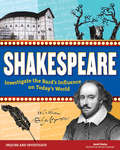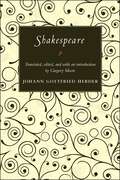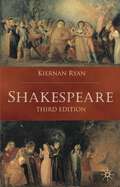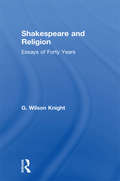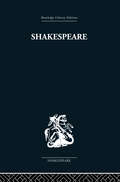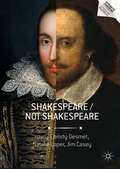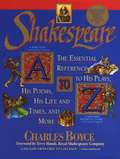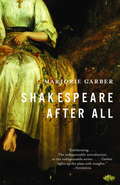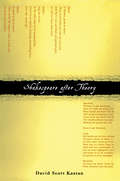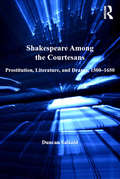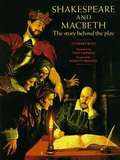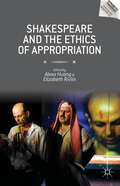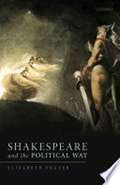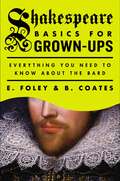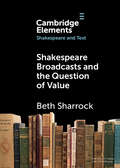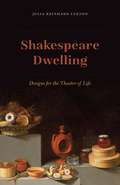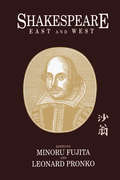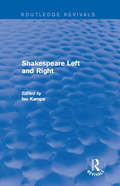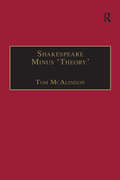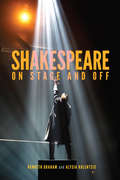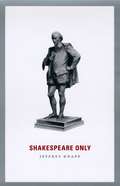- Table View
- List View
Shakespeare
by Andi Diehn"Romeo, Romeo, wherefore art thou Romeo?” Teenagers have been sighing an approximation of these words for centuries, ever since William Shakespeare had Juliet utter them from her balcony in one of the most popular plays of all time, Romeo and Juliet. Tales of love, loss, rebellion, rivalry--before there was Twilight, Warm Bodies, and The Lion King, there was Shakespeare. The characters, language, imagery, and plot elements of many books and movies that appear on bookshelves and in cinemas today are directly influenced by the plays of the Bard. In Shakespeare: Investigate the Bard’s Influence on Today’s World, readers discover links between the books, movies, and music they listen to today and the words that were written and acted out more than 400 years ago. Readers deconstruct Shakespearean themes, imagery, language, and meaning by finding familiar ground on which to gain literary insight. Through hands-on projects such as coding a video game based on one of Shakespeare’s plays to rewriting a scene in the text language of emoji, readers find compelling avenues into the dramatic, sometimes intimidating language, leaving them well-equipped to tackle any major text in the academic years to come.
Shakespeare
by Johann Gottfried HerderWithout Johann Gottfried Herder (1744–1803), we simply would not understand Shakespeare in the way we do. In fact, much literature and art besides Shakespeare would neither look the same nor be the same without the influence of Herder's "Shakespeare" (1773). One of the most important and original works in the history of literary criticism, this passionate essay pioneered a new, historicist approach to cultural artifacts by arguing that they should be judged not by their conformity to a set of conventions imported from another time and place, but by the effectiveness of their response to their own historical and cultural context. Rejecting the authority of a dominant and stifling French neoclassicism that judged eighteenth-century plays by the criteria of Aristotle, Herder's "Shakespeare" signaled a break with the Enlightenment, the approach of Romanticism, and the arrival of a distinctly modern form of aesthetic appreciation.With a vivid new translation and a fascinating introduction by Gregory Moore, this edition of Herder's classic will speak to today's readers with undiminished power and persuasiveness.
Shakespeare
by Kiernan RyanFirst published in 1989, this 3rd edition, a critical study of Shakespeare, has been revised, updated and expanded with new material, so it is twice the size of the first edition. The section on Shakespearean comedy now includes an essay on Shakespeare's first scintillating experiment in the genre, The Comedy of Errors, and a study of his most perplexing problem play, Measure for Measure. ; A new last chapter, ' Dreaming on things to come - Shakespeare and the Future of Criticism, reveals how much modern criticism can learn from the appropriation of Shakespeare by Oscar Wilde, George Bernard Shaw and James Joyce
Shakespeare
by Mark Van Doren34 chapters of critical and interpretative comment on each of the Bard's plays with another chapter on his poems
Shakespeare & Religion V 7: Essays Of Forty Years
by Wilson KnightFirst Published in 2002. Routledge is an imprint of Taylor & Francis, an informa company.
Shakespeare (Shakespeare Survey Ser. #Series Number 7)
by Allardyce NicollFirst published in 1952. An invaluable introduction to Shakespeare, this book places Shakespeare's work and criticism against the background of Elizabethan life in its historical, social, political, religious, linguistic and literary aspects. Contents include: The Problem of Interpretation; Shakespeare at Work; Man and Society; Man and the Universe; The Inner Life.
Shakespeare / Not Shakespeare
by Christy Desmet Natalie Loper Jim CaseyThis essay collection addresses the paradox that something may at once "be" and "not be" Shakespeare. This phenomenon can be a matter of perception rather than authorial intention: audiences may detect Shakespeare where the author disclaims him or have difficulty finding him where he is named. Douglas Lanier's "Shakespearean rhizome," which co-opts Deleuze and Guattari's concept of artistic relations as rhizomes (a spreading, growing network that sprawls horizontally to defy hierarchies of origin and influence) is fundamental to this exploration. Essays discuss the fine line between "Shakespeare" and "not Shakespeare" through a number of critical lenses--networks and pastiches, memes and echoes, texts and paratexts, celebrities and afterlives, accidents and intertexts--and include a wide range of examples: canonical plays by Shakespeare, historical figures, celebrities, television performances and adaptations, comics, anime appropriations, science fiction novels, blockbuster films, gangster films, Shakesploitation and teen films, foreign language films, and non-Shakespearean classic films.
Shakespeare A to Z: The Essential Reference to His Plays, His Poems, His Life and Times, and More
by Charles BoyceWhat famous essayist insisted that Shakespeare's play were unfit for performance? Which two plays center on the Hundred Years' War? In which scene of Romeo and Juliet does the nurse report--falsely--that Juliet is dead and thus seal Romeo's tragic fate? The answers are easily found in Shakespeare A to Z, the only single-volume reference to virtually everything one needs--or wants--to know about the Bard. Wonderfully informative, this comprehensive work includes 3,000 entries and 50 illustrations.
Shakespeare After All
by Marjorie GarberA brilliant and companionable tour through all thirty-eight plays, Shakespeare After All is the perfect introduction to the bard by one of the country&’s foremost authorities on his life and work. Drawing on her hugely popular lecture courses at Yale and Harvard over the past thirty years, Marjorie Garber offers passionate and revealing readings of the plays in chronological sequence, from The Two Gentlemen of Verona to The Two Noble Kinsmen. Supremely readable and engaging, and complete with a comprehensive introduction to Shakespeare&’s life and times and an extensive bibliography, this magisterial work is an ever-replenishing fount of insight on the most celebrated writer of all time.
Shakespeare After Theory
by David Scott KastanThe most familiar assertion of Shakespeare scholarship is that he is our contemporary. Shakespeare After Theory provocatively argues that he is not, but what value he has for us must at least begin with a recognition of his distance from us.
Shakespeare Among the Courtesans: Prostitution, Literature, and Drama, 1500-1650 (Anglo-Italian Renaissance Studies)
by Duncan SalkeldCourtesans - women who achieve wealth, status, or power through sexual transgression - have played both a central and contradictory role in literature: they have been admired, celebrated, feared, and vilified. This study of the courtesan in Renaissance English drama focuses not only on the moral ambivalence of these women, but with special attention to Anglo-Italian relations, illuminates little known aspects of their lives. It traces the courtesan from a wry comedic character in the plays of Terence and Plautus to its literary exhaustion in the seventeenth-century dramatic works of Dekker, Marston, Webster, Middleton, Shirley and Brome. The author focuses especially on the presentation of the courtesan in the sixteenth century - dramas by Shakespeare, Marlowe, and Lyly view the courtesan as a symbol of social disease and decay, transforming classical conventions into English prejudices. Renaissance Anglo-Italian cultural and sexual relations are also investigated through comparisons of travel narratives, original source materials, and analysis of Aretino's representations of celebrated Italian courtesans. Amid these fascinating tales of aspiration, desire and despair lingers the intriguing question of who was the 'dark lady' of Shakespeare's sonnets.
Shakespeare And Macbeth: The Story Behind the Play
by Stewart Ross Kenneth Branagh Tony KarpinskiHistorical finding and current critical thinking are woven together to tell the fascinating story of how Shakespeare conceived and wrote one of his greatest plays. As readers watch the production being mounted, Ross's narrative and Karpinski's carefully researched illustrations bring Shakespeare's world to vivid life. Full-color and black-and-white illustrations.
Shakespeare And The Ethics Of Appropriation
by Alexa Huang Elizabeth RivlinMaking an important new contribution to rapidly expanding fields of study surrounding the adaptation and appropriation of Shakespeare, Shakespeare and the Ethics of Appropriation is the first book to address the intersection of ethics, aesthetics, authority, and authenticity.
Shakespeare And The Political Way
by Elizabeth FrazerStudies of Shakespeare and politics often ask the question whether his dramas are on the side of aristocratic or monarchical sovereign authority, or are on the side of those who resist; whether he endorses a standard view of male and patriarchal authority, or whether his cross-dressing heroines put him among feminist thinkers. Scholars also show that Shakespeare's representations of rule, revolt, and arguments about laws and constitutions draw on and allude to stories and real events that were contemporaneous for him, as well as historical ones. <p><p> Building on scholarship about Shakespeare and politics, this book argues that Shakespeare's representations and stagings of political power, sovereignty, resistance, and controversy are more complex. The merits of political life, as opposed to life governed by monetary exchange, religious truth, supernatural power, military heroism, or interpersonal love, are rehearsed in the plots. And the clashing and contradictory meanings of politics -- its association with free truthful speech but also with dishonest hypocrisy, with open action and argument as much as occult behind the scenes manoevring -- are dramatized by him, to show that although violence, lies, and authoritarianism do often win out in the world there is another kind of politics, and a political way that we would do well to follow when we can. The book offers original readings of the characters and plots of Shakespeare's dramas in order to illustrate the subtlety of his pictures of political power, how it works, and what is wrong and right with it.
Shakespeare Basics for Grown-Ups
by E. Foley B. CoatesAn essential guide to Shakespeare, from the international bestselling authors of Homework for Grown-Ups The Bard was so incredibly prolific that even most Shakespeare scholars would welcome the occasional refresher course, and most of the rest of us haven't even got a clue as to what a petard actually is. Fear not, the bestselling authors of Homework for Grown-Ups are here to help. For parents keen to help with their children's homework, casual theatre-goers who want to enhance their enjoyment and understanding, and the general reader who feels they should probably know more, Shakespeare Basics for Grown-Ups includes information on the key works, historical context, contemporaries and influences, famous speeches and quotations, modern day adaptations, and much, much more.
Shakespeare Beyond Doubt
by Stanley Wells Paul EdmondsonDid Shakespeare write Shakespeare? The authorship question has been much treated in works of fiction, film and television, provoking interest all over the world. Sceptics have proposed many candidates as the author of Shakespeare's works, including Francis Bacon, Christopher Marlowe and Edward De Vere, the seventeenth Earl of Oxford. But why and how did the authorship question arise and what does surviving evidence offer in answer to it? This authoritative, accessible and frequently entertaining book sets the debate in its historical context and provides an account of its main protagonists and their theories. Presenting the authorship of Shakespeare's works in relation to historiography, psychology and literary theory, twenty-three distinguished scholars reposition and develop the discussion. The book explores the issues in the light of biographical, textual and bibliographical evidence to bring fresh perspectives to an intriguing cultural phenomenon.
Shakespeare Beyond English
by Susan Bennett Christie CarsonTackling vital issues of politics, identity and experience in performance, this book asks what Shakespeare's plays mean when extended beyond the English language. From April to June 2012 the Globe to Globe Festival offered the unprecedented opportunity to see all of Shakespeare's plays performed in many different world languages. Thirty-eight productions from around the globe were presented in six weeks as part of the World Shakespeare Festival, which formed a cornerstone of the Cultural Olympics. This book provides the only complete critical record of that event, drawing together an internationally renowned group of scholars of Shakespeare and world theatre with a selection of the UK's most celebrated Shakespearean actors. Featuring a foreword by Artistic Director Dominic Dromgoole and an interview with the Festival Director Tom Bird, this volume highlights the energy and dedication that was necessary to mount this extraordinary cultural experiment.
Shakespeare Broadcasts and the Question of Value (Elements in Shakespeare and Text)
by Beth SharrockThis Element investigates the framing 'texts' of Shakespeare's works in live theatre broadcasts produced by the Royal Shakespeare Company. Despite growing engagement from scholars of digital Shakespeares with the phenomenon of broadcast theatre and the aesthetics of filmed productions, the paratexts which accompany the live-streams − live or pre-recorded features, including interviews and short films − have largely been ignored. The Element considers how RSC live broadcasts of rarely performed, often critically maligned works are mediated for contemporary audiences, focusing on The Two Gentlemen of Verona (2014), Titus Andronicus (2017), and The Merry Wives of Windsor (2018). It questions the role of the theatre institution as a powerful broker in the (re)negotiation of hierarchies of value within Shakespeare's canon. Individual sections also trace the longer genealogies of paratextual value-narratives in print, proposing that broadcast paratexts be understood as participating in a broader history of Shakespearean paratexts in print and performance.
Shakespeare Dwelling: Designs for the Theater of Life
by Julia Reinhard LuptonGreat halls and hovels, dove-houses and sheepcotes, mountain cells and seaside shelters—these are some of the spaces in which Shakespearean characters gather to dwell, and to test their connections with one another and their worlds. Julia Reinhard Lupton enters Shakespeare’s dwelling places in search of insights into the most fundamental human problems. Focusing on five works (Romeo and Juliet, Macbeth, Pericles, Cymbeline, and The Winter’s Tale), Lupton remakes the concept of dwelling by drawing on a variety of sources, including modern design theory, Renaissance treatises on husbandry and housekeeping, and the philosophies of Hannah Arendt and Martin Heidegger. The resulting synthesis not only offers a new entry point into the contemporary study of environments; it also shows how Shakespeare’s works help us continue to make sense of our primal creaturely need for shelter.
Shakespeare East and West
by Minoru Fujita Leonard PronkoThe International Shakespeare Association meeting, held in Tokyo in August of 1991, was regarded by many of the participating academics as a milestone in terms of the quality of the papers given and extent to which the intercultural and cross-cultural study of Shakespeare had been developed. This volume contains the principal contributions (10) to the panel on Acting and Language in Shakespeare and Eastern Drama, specially edited for publication by Minoru Fujita who teaches at the Graduate School of Culture, University of Osaka, and Leonard Pronko, Professor of Theatre at Pomona College, Claremont, California. The papers are presented in three sections: Playhouses and Performances, Literary History, and Interpretation and Theoretical Issues.
Shakespeare Left and Right (Routledge Revivals)
by Ivo KampsShakespeare Left and Right brings together critics, strikingly different in their politics and methodologies, who are acutely aware of the importance of politics on literary practice and theory. Should, for example, feminist criticism be subjected to a critique by voices it construes as hostile to its political agenda? Is it possible to present a critique of feminist criticism without implicitly impeding its politics? And, in the light of recent political events should the Right pronounce the demise of Marxism as a social science and interpretive tool? The essays in Shakespeare Left and Right, first published in 1991, present a tug of war about ideology, acted out over the body of Shakespeare. Part One focuses on the challenge thrown down by Richard Levin's widely discussed "Feminist Thematics and Shakespearean Tragedy". Part Two considers these issues in relation to critical practice and the reading of specific plays. This book should be of interest to undergraduates and academics interested in Shakespeare studies.
Shakespeare Minus 'Theory'
by Tom McAlindonDemonstrating and defending a method of close reading and historical contextualisation of Shakespeare and his contemporaries, this collection of essays by Tom McAlindon combines a number of previously published pieces with original studies. The volume includes six interpretative studies, all but one of which involve challenges to radical readings of the plays involved, including Henry V, Coriolanus, The Tempest, and Doctor Faustus. The other three essays are critiques of the claims and methods of radical, postmodernist criticism (new historicism and cultural materialism especially); they illustrate the author's conviction that some leading scholars in the field of Renaissance literature and drama, who deserve credit for shifting attention to new areas of interest, must also be charged with responsibility for a marked decline in standards of analysis, interpretation, and argument. Likely to provoke considerable debate, this stimulating collection is an important contribution to Shakespeare studies.
Shakespeare On Stage and Off
by Kenneth Graham Alysia KolentsisToday, debates about the cultural role of the humanities and the arts are roiling. Responding to renewed calls to reassess the prominence of canonical writers, Shakespeare On Stage and Off introduces new perspectives on why and how William Shakespeare still matters. <p><p>Lively and accessible, the book considers what it means to play, work, and live with Shakespeare in the twenty-first century. Contributors – including Antoni Cimolino, artistic director of the Stratford Festival – engage with contemporary stagings of the plays, from a Trump-like Julius Caesar in New York City to a black Iago in Stratford-upon-Avon and a female Hamlet on the Toronto stage, and explore the effect of performance practices on understandings of identity, death, love, race, gender, class, and culture. Providing an original approach to thinking about Shakespeare, some essays ask how the knowledge and skills associated with working lives can illuminate the playwright's works. Other essays look at ways of interacting with Shakespeare in the digital age, from Shakespearean resonances in Star Trek and Indian films to live broadcasts of theatre performances, social media, and online instructional tools. Together, the essays in this volume speak to how Shakespeare continues to enrich contemporary culture. <p><p>A timely guide to the ongoing importance of Shakespearean drama, Shakespeare On Stage and Off surveys recent developments in performance, adaptation, popular culture, and education. <p><p>Contributors include Russell J. Bodi (Owens State Community College), Christie Carson (Royal Holloway University of London), Brandon Christopher (University of Winnipeg), Antoni Cimolino (Stratford Festival), Jacob Claflin (College of Eastern Idaho), Lauren Eriks Cline (University of Michigan), David B. Goldstein (York University), Gina Hausknecht (Coe College), Peter Holland (University of Notre Dame), R.W. Jones (University of Texas), Christina Luckyj (Dalhousie University), Julia Reinhard Lupton (University of California, Irvine), Linda McJannet (Bentley University), Roderick H. McKeown (University of Toronto), Hayley O'Malley (University of Michigan), Amrita Sen (University of Calcutta), Eric Spencer (The College of Idaho), Lisa S. Starks (University of South Florida St Petersburg), and Jeffrey R. Wilson (Harvard University).
Shakespeare On Stage and Off
by Kenneth Graham and Alysia KolentsisToday, debates about the cultural role of the humanities and the arts are roiling. Responding to renewed calls to reassess the prominence of canonical writers, Shakespeare On Stage and Off introduces new perspectives on why and how William Shakespeare still matters. Lively and accessible, the book considers what it means to play, work, and live with Shakespeare in the twenty-first century. Contributors - including Antoni Cimolino, artistic director of the Stratford Festival - engage with contemporary stagings of the plays, from a Trump-like Julius Caesar in New York City to a black Iago in Stratford-upon-Avon and a female Hamlet on the Toronto stage, and explore the effect of performance practices on understandings of identity, death, love, race, gender, class, and culture. Providing an original approach to thinking about Shakespeare, some essays ask how the knowledge and skills associated with working lives can illuminate the playwright's works. Other essays look at ways of interacting with Shakespeare in the digital age, from Shakespearean resonances in Star Trek and Indian films to live broadcasts of theatre performances, social media, and online instructional tools. Together, the essays in this volume speak to how Shakespeare continues to enrich contemporary culture. A timely guide to the ongoing importance of Shakespearean drama, Shakespeare On Stage and Off surveys recent developments in performance, adaptation, popular culture, and education. Contributors include Russell J. Bodi (Owens State Community College), Christie Carson (Royal Holloway University of London), Brandon Christopher (University of Winnipeg), Antoni Cimolino (Stratford Festival), Jacob Claflin (College of Eastern Idaho), Lauren Eriks Cline (University of Michigan), David B. Goldstein (York University), Gina Hausknecht (Coe College), Peter Holland (University of Notre Dame), R.W. Jones (University of Texas), Christina Luckyj (Dalhousie University), Julia Reinhard Lupton (University of California, Irvine), Linda McJannet (Bentley University), Roderick H. McKeown (University of Toronto), Hayley O'Malley (University of Michigan), Amrita Sen (University of Calcutta), Eric Spencer (The College of Idaho), Lisa S. Starks (University of South Florida St Petersburg), and Jeffrey R. Wilson (Harvard University).
Shakespeare Only
by Jeffrey KnappThree decades of controversy in Shakespeare studies can be summed up in a single question: Was Shakespeare one of a kind? On one side of the debate are the Shakespeare lovers, the bardolatrists, who insist on Shakespeare’s timeless preeminence as an author. On the other side are the theater historians who view modern claims of Shakespeare’s uniqueness as a distortion of his real professional life. In Shakespeare Only, Knapp draws on an extraordinary array of historical evidence to reconstruct Shakespeare’s authorial identity as Shakespeare and his contemporaries actually understood it. He argues that Shakespeare tried to adapt his own singular talent and ambition to the collaborative enterprise of drama by imagining himself as uniquely embodying the diverse, fractious energies of the popular theater. Rewriting our current histories of authorship as well as Renaissance drama, Shakespeare Only recaptures a sense of the creative force that mass entertainment exerted on Shakespeare and that Shakespeare exerted on mass entertainment.
